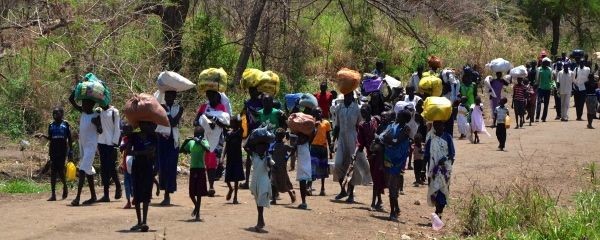Every day over 2,000 South Sudanese are fleeing their country, according to an UN update published Wednesday. This comes amid reports of deepening hunger in Upper Nile and Jonglei states, which neighbour Ethiopia, one of the countries receiving South Sudanese refugees.
The UN World Food Programme (WFP), in a report on the cross-border situation dated 9 April, explained that 280,000 South Sudanese have crossed the border into Uganda, Kenya, Ethiopia and Sudan since mid-December.
The World Food Programme says that the influx is expected to continue as the situation in South Sudan remains precarious. Over 90,000 South Sudanese refugees have entered Ethiopia.
People within Upper Nile state speaking to Radio Tamazuj on Tuesday said the situation is worsening. They complain of reduced food rations owing to WFP logistics problems caused largely by insecurity, saying the children are now too hungry to be schooled.
A population of about 120,000 Blue Nile natives migrated into the state in 2011-2012, owing to warfare in their own area to the north. Ibtisam Abdurrahman Saleh, a member of this community living in Doro camp in Upper Nile State’s Maban County, says the people are suffering badly from the shortage of food.
“The food ration being given to each person inside the camp is weighing one kilogram only,” she explained. She noted the refugees survive only by eating fruits of baobab trees and leaves, saying the hunger also contributed to spreading diseases among the refugees.
“Most of the Blue Nile refugees in the camp are sick, even the children are unable to go to school due to the lack of something to eat,” says the refugee. “A pupil cannot attend classes while he or she is hungry, it would be very difficult to understand the lesson,” she added.
“Even the IQ of the clever pupils may decline due to the lack of nutritious food,” she emphasized. She called on the humanitarian organizations to provide them with food as soon as possible, adding that they have run out of food.
WFP, which commenced recently air drops into Akobo County, says there are ‘early indications’ that these air drops reduced the number of refugees crossing the border into Ethiopia. Nonetheless, the number of South Sudanese refugees in Ethiopia is expected to rise to 140,000, says UNHCR.
Photo: New arrivals to Kule refugee camp, bused from the nearby Pagak entry point WFP/Lisa Bryant




